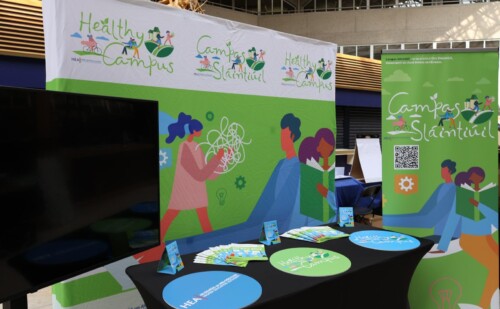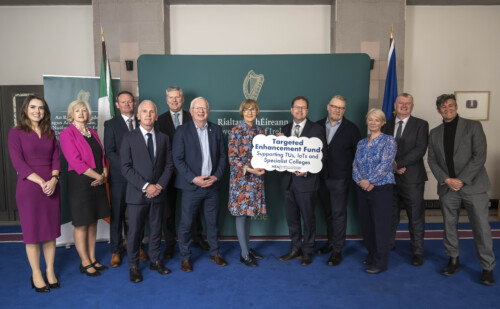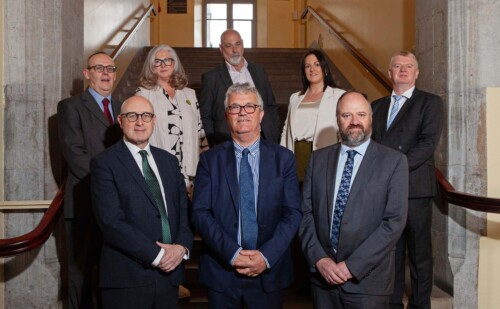HEA welcomes the announcement of 20 new posts targeted at addressing gender under-representation at senior academic levels
By Maura O'Shea
Posted: 3 January, 2020

- Senior Academic leadership Initiative will address gender imbalance at senior decision-making levels in Irish higher education
- New gender-targeted posts announced to support Higher Education Institutions deliver on gender equality objectives
Today, Mary Mitchell O’Connor T.D., Minister of State with special responsibility for Higher Education, announced the funding of 20 senior academic posts across the Irish higher education system under the Senior Academic Leadership Initiative (SALI). The SALI is a positive action initiative aimed at addressing gender underrepresentation in senior leadership roles in our higher education institutions (HEIs). These posts, which are new and additional in the HE system, will increase gender diversity at senior decision-making level across the HE system. New posts will be created across the higher education sector in a variety of disciplines. The outcomes of this initiative will have a pronounced impact on areas with an acute gender imbalance, including Computer Science, Engineering Mathematics, Physics, Health Science, History and Geography.
According to the latest Higher Education Staff Profiles by Gender, in the university sector, 26% of high-level Professors are female compared to 52% at Lecturer level, the entry level for academic posts. While these figures demonstrate a 1-2% increase annually of female staff at senior academic levels, analysis carried out by the Gender Action Taskforce in 2018 estimated that with this rate of change and the continuation of current promotion and recruitment practices in relation to underrepresented candidates, it could take up to 20 years to reach gender balance at professor level in the university sector. The Taskforce therefore recommended that further positive action measures should be considered, where they would be a proportionate and effective means to achieve rapid and sustainable change. In this context, the Department of Education and Skills announced a call for application to the SALI in June 2019. Key requirements for this call included HEIs having a Gender Action Plan in place and being able to demonstrate that their institutional recruitment and promotion procedures were gender proofed.
The new posts created through the Senior Academic Leadership Initiative are a positive action measure that will both increase the number of women in decision-making roles and the number of senior female role models in Irish HE. These posts will be in areas of significant gender underrepresentation and where the new position will lead to considerable strategic impact, as assessed by the International Assessment Panel who reviewed applications to the call. This panel, chaired by Professor Lesley Yellowlees CBE of Edinburgh University, consisted of 10 international experts with gender equality expertise, as well as broad disciplinary knowledge and strategic level experience. The members of the assessment panel were as follows:
- Professor Lesley Yellowlees CBE, Professor of Inorganic Electrochemistry, University of Edinburgh
- Eilidh Fraser, Director of HR & Organisational Development, Abertay University
- Patrick Johnson, Head of Equality, Diversity and Inclusion, University of Manchester
- Dr Helen Peterson, Senior Lecturer in Sociology, University of Gothenburg
- Marissa Herder, Senior Policy Advisor, Dutch Ministry of Education, Culture and Science
- Professor Knut Liestøl, Professor of Informatics, University of Oslo
- Professor Peter Main, Professor of Physics, King’s College London
- Dr Carl Jacobsson, Senior Advisor, Swedish Research Council
- Professor Chantal Davies, Professor of Law, Equality and Diversity, University of Chester
- Professor Tomas Brage, Professor of Mathematical Physics, Lund University
Commenting on the outcome of the 2019 SALI call, Professor Yellowlees, chair of the expert panel, commented:
“This is an important initiative in an international context, as it demonstrates how brave and positive interventions at a national level can help drive gender equality in HEIs.”
Dr Ross Woods, heading up the Centre of Excellence for Gender Equality stated:
“Institutions to be funded under this initiative demonstrated progress on gender equality through institutional action plans and the appointment of women in senior decision-making roles will only help to drive this important work. The success of diverse institutions in the 2019 SALI round is a testament to the progress being made at institutional level across the HE system.”
Each higher education institution will now seek to appoint suitably qualified candidates to these posts. The recruitment process will be subject to the normal high level of strict institutional assessment and processes as for any other senior posts.
It is expected that the SALI will award funding for up to 45 senior academic leadership posts over the next three years and a further call for applications to the SALI will be announced in 2020.
List of Posts to be funded under the Senior Academic Leadership Initiative
| Institution | Post Title |
| Athlone Institute of Technology | Dean of Graduate Studies and Research |
| Cork Institute of Technology | Chair of Cyber Security |
| Dublin City University | Professor in Computer Science (Natural Language Processing) |
| Dublin City University | Professor of Plasma Physics |
| Dublin Institute for Advanced Studies | Senior Professor (Physics) |
| Institute of Technology, Carlow | Director of Engineering Research and Innovation |
| Maynooth University | Professor in Physical Geography in the area of Climate Science (Adaptation and/or Mitigation) |
| Maynooth University | Professor in Computer Science in the area of Software Platform Architecture and Society |
| National University of Ireland, Galway | Professor of Engineering |
| National University of Ireland, Galway | Professor of Older Adult Health |
| Technological University Dublin | Professor of Public Trust in Media, Arts and Technology |
| Technological University Dublin | Professorship in Inclusive Computer Science |
| Trinity College Dublin | Chair in Mathematics |
| Trinity College Dublin | Chair in Political Economy |
| University College Cork | Professor of Irish Gender History |
| University College Cork | Professor of Microbiome and Health Science |
| University College Dublin | Professor of Biomedical Engineering |
| University College Dublin | Professor of Materials Chemistry |
| University of Limerick | Professor of Data Science and Statistical Learning |
| University of Limerick | Professor of Genomics and Biomedical Sciences |


